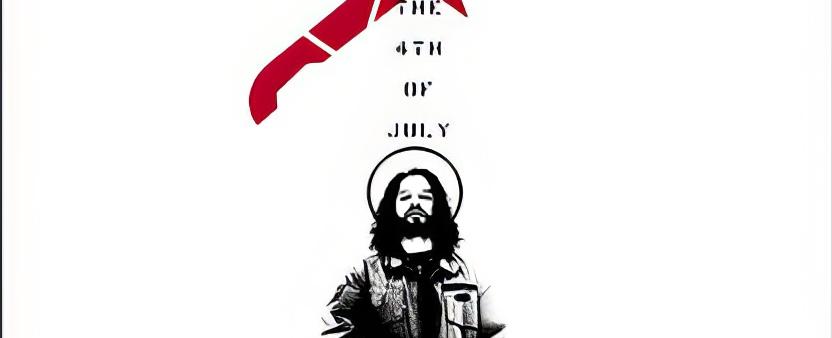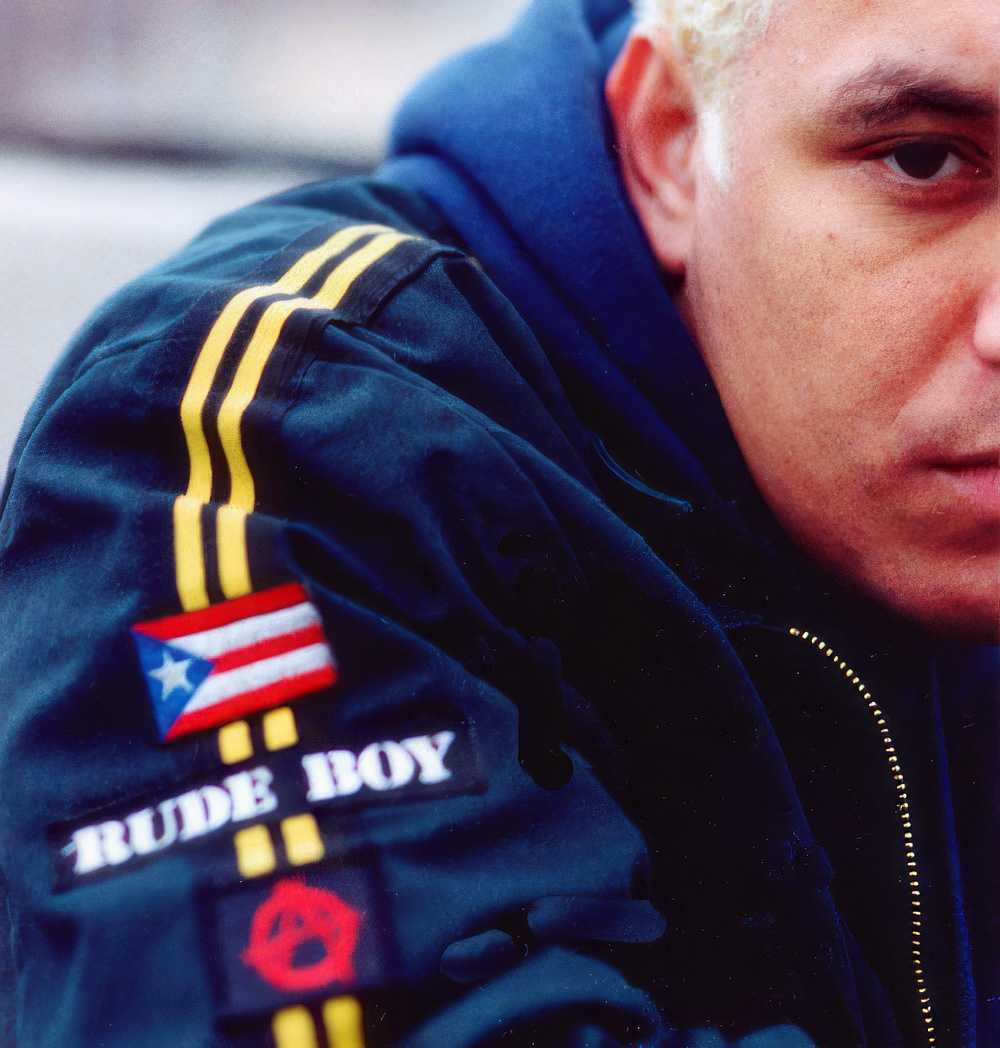



In Puerto Rico in the late 1960’s an underground military army was founded to fight for Puerto Rico’s self determination. This group was called El Ejercito Popular Boricua (EPB), - the Popular Puerto Rican Army and was affectionately know as “The Macheteros”. The Macheteros had a saying “Todos Boricua Machetero” - “Every Puerto Rican is a Machetero”. The saying only reinforced the themes of the film. If every Puerto Rican is a Machetero and a Machetero fights for freedom and there are those who are trying to keep you from having that freedom then a cycle of violence emerges, so titling the film Machetero was only natural.
Q: In your opinion how is a government that sends troops to attack and invade a country (such as Palestine or Iraq) any different from smaller "terrorist" organizations? What's your definition of terrorism?A: Terrorism seems to be a word of scale. You even alluded to it in your question. If you’re in Gaza and Israeli bombs are falling around your home then that could be described as a pretty terrifying situation for the people who live in and around that home. Many people don’t see those actions by the Israeli state as being acts of terrorism because the Israeli state is trying to define what is and what isn’t terrorism in terms of this conflict. However we would all have to agree that having your home or business or school or hospital or place of worship bombed is terrifying and qualifies as an act of terror. But because it’s being done by a state mandated military and because terrorism is something that’s usually defined by those who are the aggressor, it’s not labeled as terrorism. Controlling and restricting the definition of “terrorism” and reshaping it in terms of scale allows the aggressor to be able to take part in terrorism without ever having to be accused of terrorism. The film tries to address some of these issues of semantics by trying to shift the paradigm to include the actions of the aggressor. This is one of the post 9/11 discussions that I felt needed to happen on a larger scale and that I felt just wasn’t happening. I think terrorism is an everyday thing all around the world. I think that inequality and injustice is terrorism. I think that poverty is a kind of terrorism, I think that a lack of health care is a kind of terrorism, I think that the limited access to education and housing, clean water and healthy food is all terrorism…Q: What is the difference between an "Anti-Manifesto" and a Manifesto?A: A manifesto is a declaration of ideas and politics. In the film the Pedro Taino (the so-called “terrorist”) writes an anti-manifesto that he passes onto a ghetto youth in the street, this anti-manifesto becomes one of the things that encourage him to become a Machetero. The reason it was called an “anti-manifesto” was because it was meant to be a manual on how to be a Machetero. It wasn’t a declaration of ideas and politics in the way that say the communist manifesto was; it was more like the Hagakure. The Hagakure is a 16th century manual on bushido or how to be a Samurai written by Yamamoto Tsunetomo. It talks about how a Samurai should conduct his life in every way possible. The anti-manifesto was patterned after that. What we did with the film and the anti-manifesto was take the previous definitions and ideas of a “machetero” and extend them into a way of life, in order to make it “Machetero”. The anti-manifesto talks about how the “Machetero” should live his or her life and in doing so shapes a kind of politic for the Machetero to follow. So it’s kind of like a manifesto but it’s coming from a different approach.Q: How does the Machetero's ideology compare and contrast with your own political views?A: Bob Marley was asked in an interview how long he had been a Rasta and Bob’s reply was “I been a Rasta ever since…” and I thought that was a beautiful sentiment. On another occasion a journalist asked him that same question and Bob answered “It’s not how long you been a Rasta, but how long it take you to grow to Rasta.” I would say the same is true with the ideology of “Machetero”.Q: Are there any other films that had an influence on you or inspired you to make Machetero?A: There were a lot of films that influenced Machetero. Thematically Battle Of Algiers by Gillo Portecorvo, Sweet Sweetback’s Baadasssss Song by Melvin Van Peebles and The Spook Who Sat By The Door by Ivan Dixon and Sam Greenlee were the largest influences in terms of creating an anti-imperialist film. Other thematic influences include the Palestinian filmmaker Hany Abu-Assad’s Paradise Now, and Martin Scorsese’s The Last Temptation Of Christ.Structurally there were a few other influences like The Limey by Steven Soderbergh, In Praise of Love by Jean Luc Godard and Ghost Dog: The Way of the Samurai by Jim Jarmusch.
Those were the films that I felt had a direct impact on the making of Machetero but I think that when artists create they are creating with everything that has ever influenced them. In the case of Machetero it was also books like Franz Fanon’s The Wretched Of The Earth, Paulo Frierie’s The Pedagogy Of The Oppressed and Sun Tzu’s The Art Of War. Two film essays from Latin America also heavily influenced Machetero. One essay entitled Towards A Third Cinema by Fenrando Solanas and Octavio Getino, two Argentinean filmmakers and another essay entitled For An Imperfect Cinema by Cuban filmmaker Julio Garcia Espinoza.
Music was also a major inspiration in the making of the film. The NYC Puerto Punk band RICANSTRUCTION, had a huge influence on Machetero. RICANSTRUCTION improvised an original score for the film. Their 1st album, Liberation Day informed, guided and shaped the script to the point that seven of the album’s 13 songs are included in the film and those songs aren’t just background but are crucial and integral piece to the film.
Q: Where was the film shot? A: The film was shot in New York City and Puerto Rico with one scene being shot in Philadelphia. The prison we shot in was an actual prison near Yankee Stadium in the Bronx and used to be the Bronx House of Detention. Most of the film was shot in East Harlem where I lived at the time. All the scenes that were shot in Puerto Rico were shot in Loiza, which was an area that was given to newly freed slaves after Puerto Rico abolished slavery. That was important because the abolition movement in Puerto Rico and the independence movement were very closely aligned.Q: What are some of the awards and nominations that Machetero has garnered so far? A: Machetero has received quite a few nominations recently. The film was a finalist in the Black Hollywood Film Festival and won Best First Film last year at the International Film Festival South Africa. The film is also up for two more awards in the UK. The win in South Africa (which was the film’s African premiere) was an emotional one because of the history of struggle that South Africa has been through. When we made this film weren’t just trying to be provincial (in terms of Puerto Rico) in talking about issues of colonialism but wanted to relate it to the African Diaspora because Puerto Rico is a part of the African Diaspora. I think that the South Africans saw themselves in this film, so winning our first award in South Africa was extremely special.Q: Do you feel that film can enlighten people and transform society?A: No. I think the purpose of the film is to create dialogue or discussion but that it’s up to people to enlighten and transform society.Q: What is the best piece of advice you can give to a young aspiring filmmaker?A: Shoot first and worry about a budget later.NEXT TWO SCREENINGS:-SWANSEA BAY FILM FESTIVAL SWANSEA BAY WALES UK MAY 31ST - JUNE 6TH-HEART OF ENGLAND FILM FESTIVAL TAMWORTH ENGLAND UK JUNE 8th - JUNE 13th
Tags
Share
Quick Links
Legal Stuff
